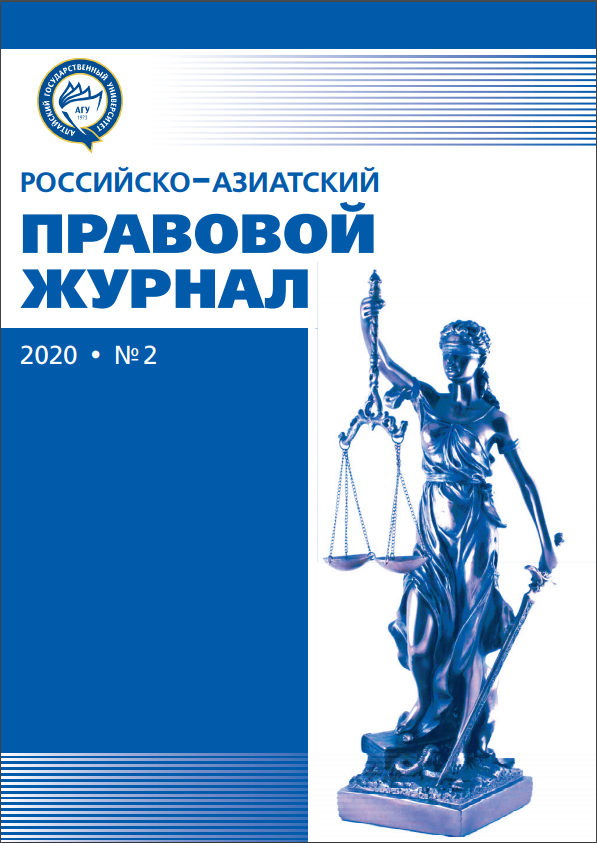THE PROBLEMS OF DETERMINING THE CONFORMITY OF DEFENCE MEASURES WITH THE NATURE AND RISK OF ASSAULT BY THE JUSTIFIABLE DEFENCE
УДК 343.228 ББК 67.408.015
Abstract
The conformity of defence with the nature and risk of assault is one of the most controversial aspects incriminal law science. If a socially dangerous assault or threat of its implementation did not involve violencedangerous to the life of the defending person or another person, the law obliges the defending person tochoose a special pattern of conduct in accordance with Part 2 of Article 37 of the Criminal Code of theRussian Federation, namely to find a way to repel the attack that will correspond to the nature and dangerof the assault.However, the law does not contain clear criteria for the determination of defence measures, which notonly limits citizens «ability to repel assaults, but also promotes sentences where the actions of the defendingperson are incorrectly classified either as exceeding the limits of the justifiable defence or on general grounds.Criminal law science offers different approaches to solving the problem, from establishing some criteria torenouncing them (completely unlimited defence).
Downloads
References
2. Смирнова Л.Н. Проблемы оценки правомерности необходимой обороны (по материалам судебной практики). URL: https://cyberleninka.ru/article/v/problemy-otsenki-pravomernosti-neobhodimoyoborony-po -materialam-sudebnoy-praktiki (дата обращения: 06.05.2020).
3. Попов А.Н. Обстоятельства, исключающие преступность деяния: Серия «Современные стандарты в уголовном праве и уголовном процессе» / науч. ред. проф. Б.В. Волженкин. СПб., 1998.
4. Уголовное право России (Общая часть) : учебное пособие / В.В. Диаконов URL: http://www. allpravo.ru/library/doc101p0/instrum104/ (дата обращения: 08.05.2020).
5. Каримов Т.У. Пределы необходимой обороны: основные научные концепции // Вестник Тюменского государственного университета. 2012. №3.
6. Жириновский предложил изменить пределы самообороны. URL:https://www.rbc.ru/rbcfreenews/5ddb2b519a79477a92770754 (дата обращения: 10.05.2020).
7. Постановление Президиума Омского областного суда от 17.04.2017 №44-У-47/2017 // СПС «КонсультантПлюс».
8. Справка по результатам изучения практики применения судами норм о необходимой обороне и иных обстоятельствах, исключающих преступность деяния. URL: http://oblsud.irk.sudrf.ru/modules.php?name=docum_sud&id=445 (дата обращения: 07.05.2020).
9. Герасимова Е.В. К вопросу об условиях правомерности необходимой обороны. URL: https:// cyberleninka.ru/article/n/k-voprosu-ob-usloviyah-pravomernosti-neobhodimoy-oborony (дата обращения: 10.05.2020).
10. Постановление Пленума ВС РФ от 27.09.2012 «О применении судами законодательства о необходимой обороне и причинении вреда при задержании лица, совершившего преступление». URL: https://rg.ru/2012/10/03/plenum-dok.html (дата обращения: 08.05.2020).
Russian-Asian Law Journal is a golden publisher, as we allow self-archiving, but most importantly we are fully transparent about your rights.
Authors may present and discuss their findings ahead of publication: at scientific conferences, on preprint servers, in public databases, and in blogs, wikis, tweets, and other informal communication channels.
Russian-Asian Law Journal allows authors to deposit manuscripts (currently under review or those for intended submission) in non-commercial, pre-print servers such as ArXiv.
Authors who publish with this journal agree to the following terms:
- Authors retain copyright and grant the journal right of first publication with the work simultaneously licensed under a Creative Commons Attribution License that allows others to share the work with an acknowledgement of the work's authorship and initial publication in this journal.
- Authors are able to enter into separate, additional contractual arrangements for the non-exclusive distribution of the journal's published version of the work (e.g., post it to an institutional repository or publish it in a book), with an acknowledgement of its initial publication in this journal.
- Authors are permitted and encouraged to post their work online (e.g., in institutional repositories or on their website) prior to and during the submission process, as it can lead to productive exchanges, as well as earlier and greater citation of published work (See The Effect of Open Access).








